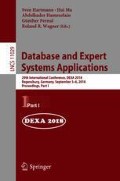Abstract
In addition to maximizing the revenue, retailers also aim at diversifying product offerings for facilitating sustainable revenue generation in the long run. Thus, it becomes a necessity for retailers to place appropriate itemsets in a limited k number of premium slots in retail stores for achieving the goals of revenue maximization and itemset diversification. In this regard, research efforts are being made to extract itemsets with high utility for maximizing the revenue, but they do not consider itemset diversification i.e., there could be duplicate (repetitive) items in the selected top-utility itemsets. Furthermore, given utility and support thresholds, the number of candidate itemsets of all sizes generated by existing utility mining approaches typically explodes. This leads to issues of memory and itemset retrieval times. In this paper, we present a framework and schemes for efficiently retrieving the top-utility itemsets of any given itemset size based on both revenue as well as the degree of diversification. Here, higher degree of diversification implies less duplicate items in the selected top-utility itemsets. The proposed schemes are based on efficiently determining and indexing the top-λ high-utility and diversified itemsets. Experiments with a real dataset show the overall effectiveness and scalability of the proposed schemes in terms of execution time, revenue and degree of diversification w.r.t. a recent existing scheme.
Access this chapter
Tax calculation will be finalised at checkout
Purchases are for personal use only
References
Hansen, P., Heinsbroek, H.: Product selection and space allocation in supermarkets. Eur. J. Oper. Res. 3, 474–484 (1979)
Yang, M.H., Chen, W.C.: A study on shelf space allocation and management. Int. J. Prod. Econ. 60–61, 309–317 (1999)
Yang, M.H.: An efficient algorithm to allocate shelf space. Eur. J. Oper. Res. 131, 107–118 (2001)
Chen, M.C., Lin, C.P.: A data mining approach to product assortment and shelf space allocation. Expert Syst. Appl. 32, 976–986 (2007)
Chen, Y.L., Chen, J.M., Tung, C.W.: A data mining approach for retail knowledge discovery with consideration of the effect of shelf-space adjacency on sales. Decis. Support Syst. 42, 1503–1520 (2006)
Hart, C.: The retail accordion and assortment strategies: an exploratory study. In: The International Review of Retail, Distribution and Consumer Research, pp. 111–126 (1999)
Etgar, M., Rachman-Moore, D.: Market and product diversification: the evidence from retailing. J. Mark. Channels 17, 119–135 (2010)
Wigley, S.M.: A conceptual model of diversification in apparel retailing: the case of Next plc. J. Text. Inst. 102(11), 917–934 (2011)
Agrawal, R., Srikant, R.: Fast algorithms for mining association rules. In: Proceedings of VLDB, pp. 487–499 (1994)
Han, J., Pei, J., Yin, Y.: Mining frequent patterns without candidate generation. ACM SIGMOD Rec. 29, 1–12 (2000)
Pasquier, N., Bastide, Y., Taouil, R., Lakhal, L.: Discovering frequent closed itemsets for association rules. In: Proceedings of the ICDT, pp. 398–416 (1999)
Liu, Y., Liao, W.K., Choudhary, A.: A fast high utility itemsets mining algorithm. In: Proceedings of the International workshop on Utility-Based Data Mining, pp. 90–99 (2005)
Fournier-Viger, P., Wu, C.-W., Tseng, V.S.: Novel concise representations of high utility itemsets using generator patterns. In: Luo, X., Yu, J.X., Li, Z. (eds.) ADMA 2014. LNCS (LNAI), vol. 8933, pp. 30–43. Springer, Cham (2014). https://doi.org/10.1007/978-3-319-14717-8_3
Fournier-Viger, P., Lin, J.C.-W., Wu, C.-W., Tseng, Vincent S., Faghihi, U.: Mining minimal high-utility itemsets. In: Hartmann, S., Ma, H. (eds.) DEXA 2016. LNCS, vol. 9827, pp. 88–101. Springer, Cham (2016). https://doi.org/10.1007/978-3-319-44403-1_6
Zida, S., Fournier-Viger, P., Lin, J.C.-W., Wu, C.-W., Tseng, V.S.: EFIM: a highly efficient algorithm for high-utility itemset mining. In: Sidorov, G., Galicia-Haro, S.N. (eds.) MICAI 2015. LNCS (LNAI), vol. 9413, pp. 530–546. Springer, Cham (2015). https://doi.org/10.1007/978-3-319-27060-9_44
Fournier-Viger, P., Zida, S., Lin, J.C.-W., Wu, C.-W., Tseng, V.S.: EFIM-closed: fast and memory efficient discovery of closed high-utility itemsets. In: Perner, P. (ed.) Machine Learning and Data Mining in Pattern Recognition. LNCS (LNAI), vol. 9729, pp. 199–213. Springer, Cham (2016). https://doi.org/10.1007/978-3-319-41920-6_15
Liu, M., Qu, J.: Mining high utility itemsets without candidate generation. In: Proceedings of the CIKM, pp. 55–64. ACM (2012)
Tseng, V.S., Wu, C.W., Fournier-Viger, P., Philip, S.Y.: Efficient algorithms for mining the concise and lossless representation of high utility itemsets. IEEE TKDE 726–739 (2015)
Tseng, V.S., Wu, C.W., Shie, B.E., Yu, P.S.: UP-growth: an efficient algorithm for high utility itemset mining. In: Proceedings of the ACM SIGKDD, pp. 253–262. ACM (2010)
Chan, R., Yang, Q., Shen, Y.D.: Mining high utility itemsets. In: Proceedings of the ICDM, pp. 19–26 (2003)
Fournier-Viger, P., Wu, C.-W., Zida, S., Tseng, V.S.: FHM: faster high-utility itemset mining using estimated utility co-occurrence pruning. In: Andreasen, T., Christiansen, H., Cubero, J.-C., Raś, Z.W. (eds.) ISMIS 2014. LNCS (LNAI), vol. 8502, pp. 83–92. Springer, Cham (2014). https://doi.org/10.1007/978-3-319-08326-1_9
World’s Largest Retail Store. https://www.thebalance.com/largest-retail-stores-2892923
US Retail Industry. https://www.thebalance.com/us-retail-industry-overview-2892699
Chaudhary, P., Mondal, A., Reddy, P.K.: A flexible and efficient indexing scheme for placement of top-utility itemsets for different slot sizes. In: Reddy, P.K., Sureka, A., Chakravarthy, S., Bhalla, S. (eds.) BDA 2017. LNCS, vol. 10721, pp. 257–277. Springer, Cham (2017). https://doi.org/10.1007/978-3-319-72413-3_18
Author information
Authors and Affiliations
Corresponding author
Editor information
Editors and Affiliations
Rights and permissions
Copyright information
© 2018 Springer Nature Switzerland AG
About this paper
Cite this paper
Chaudhary, P., Mondal, A., Reddy, P.K. (2018). A Diversification-Aware Itemset Placement Framework for Long-Term Sustainability of Retail Businesses. In: Hartmann, S., Ma, H., Hameurlain, A., Pernul, G., Wagner, R. (eds) Database and Expert Systems Applications. DEXA 2018. Lecture Notes in Computer Science(), vol 11029. Springer, Cham. https://doi.org/10.1007/978-3-319-98809-2_7
Download citation
DOI: https://doi.org/10.1007/978-3-319-98809-2_7
Published:
Publisher Name: Springer, Cham
Print ISBN: 978-3-319-98808-5
Online ISBN: 978-3-319-98809-2
eBook Packages: Computer ScienceComputer Science (R0)

